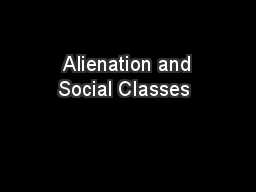PPT-Alienation and Social Classes
Author : tatyana-admore | Published Date : 2020-04-04
Karl Marx By Michael C Colon Aiyana Walker Gisselle Robles Gianna Cicchetti Toba Mohammad Dennis Heffernan and Sabrina Marotta Alienation and Social Classes CENTRAL
Presentation Embed Code
Download Presentation
Download Presentation The PPT/PDF document " Alienation and Social Classes " is the property of its rightful owner. Permission is granted to download and print the materials on this website for personal, non-commercial use only, and to display it on your personal computer provided you do not modify the materials and that you retain all copyright notices contained in the materials. By downloading content from our website, you accept the terms of this agreement.
Alienation and Social Classes : Transcript
Download Rules Of Document
" Alienation and Social Classes "The content belongs to its owner. You may download and print it for personal use, without modification, and keep all copyright notices. By downloading, you agree to these terms.
Related Documents














